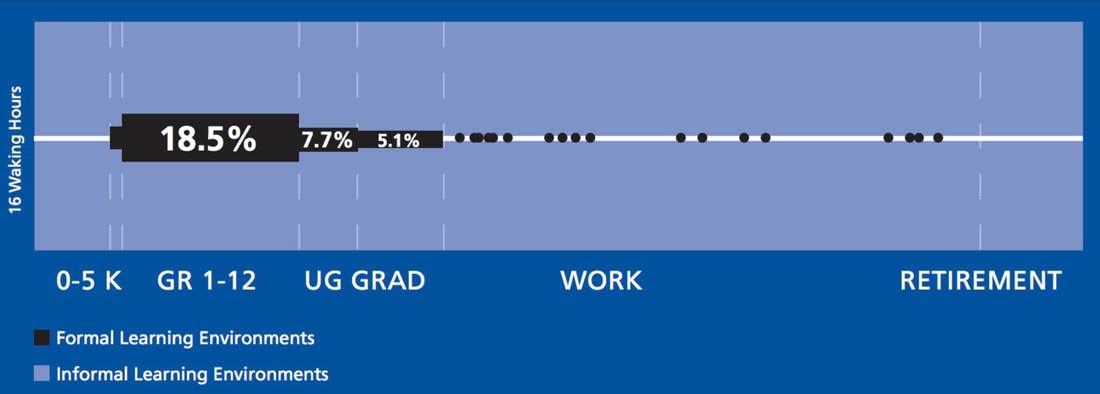INFORMAL LEARNING
|
Informal learning environments are rich in opportunities for children and youth to learn and connect with adults and peers. And, informal environments play an important role in shaping how people grow and develop as depicted by the image from the LIFE Center, to the right. As the image shows, some of our learning happens in formal environments - particularly in our early years - but the majority of our learning happens outside of these formal settings. From museums, to libraries, to parks, and everything in between - enhancing interactions in informal settings is essential to supporting children’s healthy development and learning.
|
We have worked with educators to adapt Simple Interactions in the following informal learning contexts and look forward to expanding into other informal settings as well.
Museum
Since 2015, we have collaborated with the Children’s Museum of Pittsburgh’s Learning and Research team and MAKESHOP and Studio Teaching Artists. Through this partnership, we have developed models of facilitation - focused on the universality of the SI domains - and we have conducted research about interactions in this context. To learn more, see our page on Makerspaces.
Library
We have partnered with the Carnegie Library of Pittsburgh to develop the SI Leadership Program, an advanced professional development through which participants take a deep dive into Simple Interactions and apply the foundation of SI to their work with children and youth. We find that developing relationships is a primary focus of library staff and the SI framework is useful in bringing this to the forefront.
Outdoor Education
We worked with the Pittsburgh Parks Conservancy to understand how adult-child interactions play a role in supporting children in building lifelong connections to nature. Staff shared that the process of SI helped them to be mindful about their work with children.
Museum
Since 2015, we have collaborated with the Children’s Museum of Pittsburgh’s Learning and Research team and MAKESHOP and Studio Teaching Artists. Through this partnership, we have developed models of facilitation - focused on the universality of the SI domains - and we have conducted research about interactions in this context. To learn more, see our page on Makerspaces.
Library
We have partnered with the Carnegie Library of Pittsburgh to develop the SI Leadership Program, an advanced professional development through which participants take a deep dive into Simple Interactions and apply the foundation of SI to their work with children and youth. We find that developing relationships is a primary focus of library staff and the SI framework is useful in bringing this to the forefront.
Outdoor Education
We worked with the Pittsburgh Parks Conservancy to understand how adult-child interactions play a role in supporting children in building lifelong connections to nature. Staff shared that the process of SI helped them to be mindful about their work with children.

